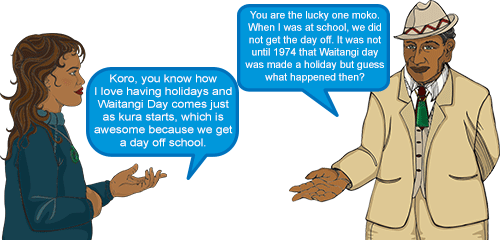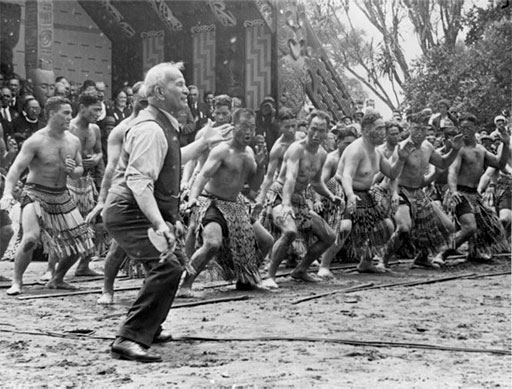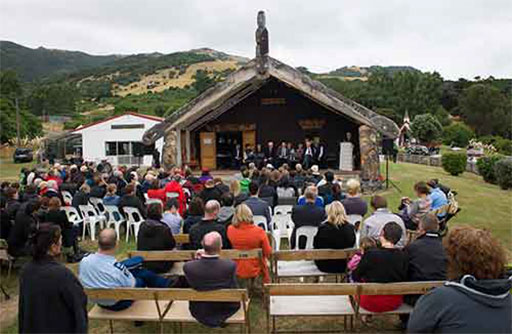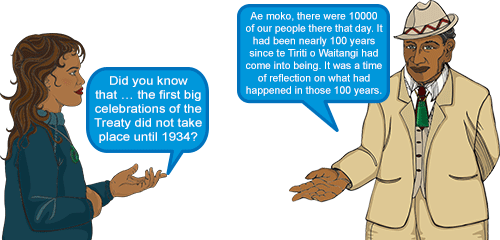February 6th is Waitangi Day in Aotearoa/New Zealand. It celebrates the date of the first signing of the Treaty of Waitangi in 1840. Waitangi is in the Bay of Islands in Te Ika A Maui / North Island.

Waitangi Day becomes a public holiday
The New Zealand Government announced that Waitangi Day would be a national holiday from 1974. It was called New Zealand Day at that time. In 1976 the Waitangi Day Act was passed to change the name back to Waitangi Day. From 2013 the public holiday to celebrate Waitangi Day will be held on the 6th of February of on the Monday following if it falls on a weekend.
Celebrating Waitangi Day
New Zealanders celebrate Waitangi Day in different ways. For some people it is just a day off work, but others like to celebrate it as a significant day in New Zealand’s history. At times, Waitangi Day has been marked by strong debate and protest from Māori and Pakeha. There is sometimes tension surrounding celebrations, especially at the Treaty Grounds at Waitangi and Parliament Buildings in Wellington. This relates to the place of the Treaty in New Zealand society today as well as marking historical ill-feeling and wrongs.
In Canterbury, Waitangi Day celebrations are held at many marae and other public places. Takapūneke and Ōnuku Marae, both on Banks Peninsula, are the bases for official celebrations near Ōtautahi / Christchurch.
Find out what's happening on Waitangi Day this year

In 2015, Ōtautahi’s Mayor Lianne Dalziel told us what Waitangi Day means to her
What does the Treaty of Waitangi mean to you?
The Treaty of Waitangi is New Zealand’s founding document. When I was a child we didn’t learn anything about it at school. As an adult I became ashamed at how little I knew. We didn’t know how to pronounce the names or know the meaning of the places where we grew up or in my case one of the schools I went to. Papanui (where I grew up) means a large piece of land and Waimairi (my first school) means peaceful water by the trees or listless water.
I am so pleased that young people today learn about our shared history with Māori, good and bad, and not just the history of the European settlers. The Treaty in modern times has served as the basis for resolving grievances that arose when its principles were not honoured. Every settlement begins with a statement of the facts (gleaned from a consideration of all the evidence by the Waitangi Tribunal) and an apology for the wrong that has been done. It is important that people own up and say sorry when they have done wrong – and in this case the wrong was done by the Crown, which lives on in the form of the Executive arm of government, which is why the apology is recorded in the Act of Parliament that confirms the settlement.
How do you celebrate Waitangi Day?
I have always celebrated Waitangi Day as a Member of Parliament by attending the celebration that is held at Ōnuku Marae (one of three places where the Treaty was originally signed in the South Island) every three years or one of the local Marae – most recently Okains Bay. This year, as Mayor of Christchurch, I am being included as part of a celebration at Rapaki Marae where I will officiate at a citizenship ceremony. There is something wonderful about welcoming new citizens on this special day.

Waitangi Day images
View Waitangi Day images from our collection:
Our resources
- Waitangi Day and The Treaty of Waitangi
- How to celebrate Waitangi Day
- What Waitangi Day means to me
- Ōnuku Marae
- Takapūneke
More information
Classroom ideas — Waitangi Day
Ideas for teachers and students of ways to celebrate Waitangi Day and learn about the Treaty. Ideas fit with New Zealand curriculum.

